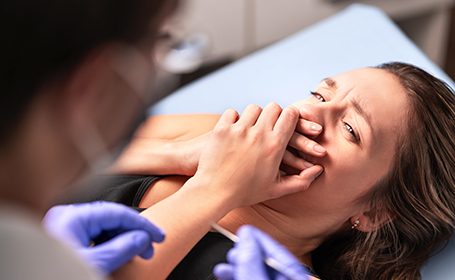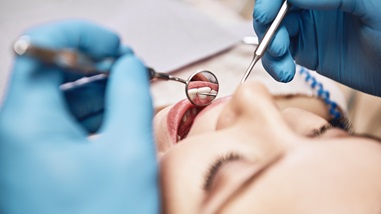
Dental phobia: Overcoming fear of the dentist
Fear of the dentist’s chair is a common problem, but what do you do when it becomes a genuine phobia? Consultant Health Psychologist Dr Sue Peacock from The Saxon Clinic shares her experience and advice on how to get over dental phobia
What is dental phobia?
Nobody likes going to the dentist, but while many can accept it as a necessary evil, some people are truly terrified.
If someone is severely anxious about visiting the dentist, showing a distinct apprehension about any aspect of the experience – from specific procedures to the whole environment – this may be classed as dental phobia.
Dental phobia can cause various problems. Sufferers may try to avoid the dentist, risking their dental and oral health.
When they are in the dental chair, they can be so distressed that it is difficult for the dentist to do their work. The process then takes longer, which does little to alleviate the patient's dread of the dentist.
Studies indicate that up to a third of people have at least a mild fear of the dentist, with 10-20% of people showing a strong anxiety or even phobia.

How common is dental phobia?
It is estimated that up to one in five people suffer from dental fear or dental phobia
Studies indicate that up to a third of people have at least a mild fear of the dentist, with 10-20% of people showing a strong anxiety or even phobia.
We don't know how many people seek help for dental phobia because the figures have never been collected. But my experience as a qualified psychologist tells me it is a common issue. It certainly brings a lot of people to my clinic.
Many of these people are suffering badly.
How can dentist phobia affect mental health?
 I see people who are so frightened of going to the dentist that they put it off at the risk of losing teeth.
I see people who are so frightened of going to the dentist that they put it off at the risk of losing teeth.
Some people with dental phobia are so anxious that they struggle to sleep, sometimes even for several nights before their appointment.
I have seen people who feel so nervous that they want to run away when they are in the waiting room. This can even escalate to panic attacks or feeling physically sick.
Once in the dentist's chair, people with dental fear or phobia may experience other very unpleasant feelings. For example, many have a fear of having objects placed into their mouth, or worry that their breathing will become difficult. The whole experience can be extremely distressing.
How do I get over my dental anxiety?
I am going to take a look at these fears and how they can be overcome, sharing some of the approaches I have taken with my clients to help them reduce their fear and anxiety.
I do believe that in most cases dental anxiety can be conquered, making life better for both patients and dentists.
Breaking down the fears
One of the characteristics of fear is that it presents as an uncontrollable, indefinable, incoherent cloud. With my clients, I find it often helps if we break down the fear into distinct areas.
Some people will fear one aspect in particular, while others may hold anxiety about a number of elements. Pain, injections and invasion of space are among the most common.
So, if you are afraid of the dentist, think about which aspects of the experience scare you and why. These can be better addressed as individual fears.
Fear of pain
Of course, we all try to avoid pain, it is part of our primitive defence mechanisms. But for some people the fear is paralysing.
Sometimes a good first step is to find out where this fear comes from. It often stems from a bad previous experience, commonly from the client's childhood.
In childhood, we all lack power. If we have a bad experience at the dentist, we can process this into several unhelpful beliefs. Powerful adults are hurting you and you cannot stop them. Your parent, who is supposed to protect you, is betraying you by doing nothing.
One established hypnotherapeutic technique is to take the client back along their own memory timeline and let them look at their unfortunate experience from their wiser, adult point of view. This can help take the emotional sting out of the memories and decouple these memories from fear of pain.
Fear of injections
This is a very common phobia, and of course many dental appointments involve an anaesthetic injection.
I often use a technique from neuro linguistic programming called the fast phobia cure here. I ask the client to imagine a cinema and to take a seat in the front row. I encourage them to relax then to see themselves on the screen happy and relaxed.
Next I ask them to see themselves having an injection then being happy and free afterwards. I get them to run over this film in their mind again and again, using sounds and colour in special ways until their fear lessens to a level where they can cope.
This technique works by divorcing emotion from events and imaginings. We then hold the thing that was causing the fear differently in our thought patterns and can cope with it.
Loss of personal space
Another emotion that can cause fear and even panic is the feeling of being overwhelmed by the close physical presence of someone you do not know or want near you (in this case the dentist).
This can sometimes be caused by unpleasant or traumatic previous experiences, such as sexual harassment or assault. In this case we can use hypnosis to disassociate these memories with the dentist experience. This can break the link and then the fear is lessened.
I teach the client to breathe slowly and deeply, using all their abdominal muscles. This creates a physiological reaction that sends messages to the brain saying 'relax, it's all okay'.
How I treat clients with dental fear and anxiety
I have so far described some of the techniques I use when a client comes to me for help with dental fear or phobia.
I now want to explain my treatment plan when it comes to addressing these fears. In my practice, I prefer to use a two-stage approach.
Stage One
I like to see a client in my own clinic several days or weeks before they have the appointment.
I will work with the client to find the roots of their fears (as described above) and work to change how they hold the memories and emotions that are causing their fears.
This is relatively simple to do. By considering memories and fears, especially those that developed in our younger lives, we can use techniques to remove unhelpful beliefs.
With the client's grown-up wisdom, and in a safe and supported environment, it is possible to detoxify those memories. And if we can do that the dental fear will be lessened. That is the core of my approach.
I also offer some practical tips and relaxation techniques which the client can use on the day of the appointment. These include:
Positive visualisation
Under hypnosis, I show the client how they can explore what being at the dentist, pain-free and relaxed, can feel like.
I then use a technique called anchoring, which enables the client to recall their positive feelings in the real situation.
Deep-breathing for relaxation
I teach the client to breathe slowly and deeply, using all their abdominal muscles. This creates a physiological reaction that sends messages to the brain saying 'relax, it's all okay.'
With a little practice the client can do this even in difficult situations, such as the dentist.

Stage Two
My 'Stage Two' involves the dentist and his or her staff, usually the dental nurse.
I look to teach these professionals some simple hypnotic techniques, which they can use while the patient is in the chair.
By inducing a light hypnotic trance, using positive reinforcing language, by using guided metaphor to distract the patient from the procedure, dental treatment can become easy for nearly everyone.
Many dentists are onto this and have learned to use these techniques successfully.
To those who have not yet tried I would say it is in your interests as well as those of your patients to spend a couple of days learning these techniques. You as a dentist will be better able to manage nervous and even phobic patients.
This means they will have a better time and your work will be finished more quickly. I would advise anyone suffering from dental phobia to seek out a dentist who uses hypnosis. It's a win all round.

Tags
How do I book an appointment?
If you're concerned about symptoms you're experiencing or require further information on this subject, talk to a GP or see an expert consultant at your local Circle Hospital.